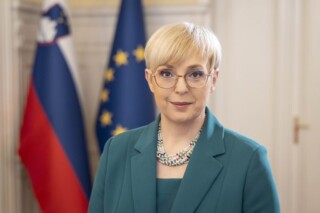By Andrej Nikolaidis, CdM columnist
Jakov Milatovic enters the second round of the presidential election full of optimism. Simple math says he has a good chance of winning.
Last night, the presidential candidates of the parties that won the parliamentary election on 30 August 2020 for only one mandate won 25% more votes than Milo Djukanovic and over 20% more votes than the two candidates of the former sovereign bloc (Djukanovic and Vuksanovic Stankovic).
This means that the 30-August winners are one step away from the Holy Grail of Montenegrin politics: from winning a two-thirds majority of mandates in the parliament in the next parliamentary election. This unlocks the possibility of changing the Constitution.
Members of less numerous nations decided in large numbers not to vote in the first round of the presidential election. This can be read from the extremely low turnout in places where less numerous nations make up the majority. This may be the result of the tactics of their national parties before the upcoming parliamentary election. But it is also the result of the decision that one part of the former sovereign bloc, including the parties of less numerous nations, enters Abazovic’s government, and the other part of the bloc votes that government in the parliament. Then the former sovereign bloc was formally broken and the parties of less numerous nations emerged in a coalition with SNP. That was Abazovic’s great success, to whom Milatoviv also owes part of last night’s result.
A significant number of former supporters of Montenegrin independence, ethnic and/or political Montenegrins, also voted for the 30-August winners. In the campaign, Djukanovic highlighted his statesmanship and historical merits for the restoration of Montenegrin independence. Red national flags were flying in his campaign video. Some voters were not impressed. They were more impressed by Milatovic’s (and Spajic’s) €250. Those citizens said in the election: sorry Milo, but €250 is €250. Yes, you’ve already heard that somewhere. And it read: Sorry Slavko, but business is business. In addition to feeling a strong, practically motherly, unconditional love for Montenegro, it seems that sovereigns appreciate the pragmatic dimension of politics.
One way or another, from one intention or another, with one or another consequence, Spajic and Milatovic made a move that made part of the citizens live better at the moment. Voters rewarded it. It’s a natural sequence of events, that’s the only way it can be. One, just one salary increase made (most likely) Milatovic the president and Spajic the prime minister of Montenegro.
That salary increase made all the difference and the former political elite of Montenegro, apart from the inevitable question “why didn’t we do it?” faced the realization that it doesn’t matter what kind of rhetoric they will use against Spajic and Milatovic. At this point, they are impenetrable. Citizens do not care about that rhetoric or any scandal that may be related to Spajic and Milatovic.
Draginja Vuksanovic Stankovic retired from SDP and from politics after a bad result in the election in which she should not have participated, but to save herself for the battles she could win. Her departure will cost SDP a considerable number of votes, but also increase, as they say, their capacity for coalitions with false civil parties and movements.
Djukanovic will not surrender. He will try to perform a political miracle. The future of DPS depends on whether he will succeed in this. If it doesn’t work, we will officially enter the post-Djukanovic phase of Montenegro.
The departure of a strong, dominant leader carries great political risks. Neither Yugoslavia nor the party survived Tito’s departure. But at the same time: there is no eternal power, as is well known.
In the period ahead, by all accounts, more or less everything will be put to the test and in the process of questioning: from the civil organization of Montenegro, through identity determinants to foreign policy priorities.
What is a risk is also a chance.




